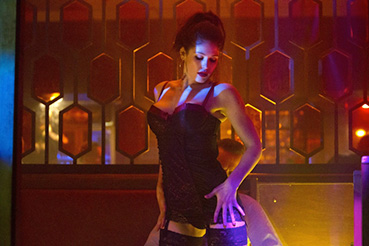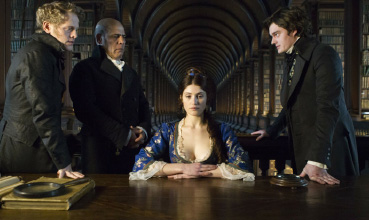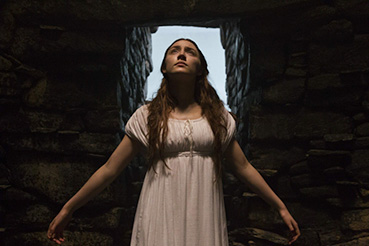|
Genre devotees will likely scoff at the suggestion that Neil Jordan's miraculously morbid return to form is the greatest vampire film ever made, but in overturning so many phallocentric clichés that come with the territory, it sure feels like it at times.
Admittedly, this reviewer has often struggled with vampires in general, be they exquisitely dressed, aristocratic ponces with 80s power dos; the boy banders with a penchant for leather trousers and the worst taste in heavy metal or the new breed of sparkly mopers cursed with eternal handsomeness and the ability to bed any woman with only the power of their petulant smolder.
Then of course there are the female victims subject to their allure. Heaving breasts sown up in fetish gear once turned, these wicked temptresses know how to please with curves as rounded as their fangs are sharp. In the long history of the genre, female vamps seduce and destroy and that's about it. Let the Right One In bucked the trend with its tale of adolescent, star-crossed lovers, but once puberty hits, as far as cinema's concerned, the majority of female bloodsuckers are full time sluts.

Byzantium has both an adolescent (Saoirse Ronan) and a harlot (Gemma Arterton) in its mother-daughter pairing at the centre of the story. First seen shimmying up a strip pole in Anne Summers gear, Jordan's camera glides over working girl Clara's barely contained bod in perfunctory, disinterested fashion, as if to get that aspect of her character out the way as quickly as possible whilst simultaneously deflating expectations of any Vampyros Lesbos type eroticism. Clara is a bombshell all right, but one always with an eye on the bottom dollar. Her desire to feed is as voracious and unapologetic as her male counterparts, but far from an oversexed vampire tart, she's a provider as well as a predator. Born into eternity as a prostitute who suffered under abusive male masters, Clara's been plying the only trade she knows since the Napoleonic Wars, primarily as a way to keep a roof over the head of her sulky, forever-teenage daughter Eleanor. Lecturing her about the importance of concealing their identity and the secrecy of their story which "can never be told", it's Clara who needs to heed her own advice. Unable to keep a low profile whenever she lashes out at (often killing) her misogynist clientele who go too far in objectifying or denigrating her, she and Eleanor are never in one place long enough to put down roots. Perpetually on the run from the authorities (both vampire and human), her profession handily fulfills the carnal needs of whatever town they find themselves in next.
Landing in a run-down part of Brighton, the girls hit pay dirt when they run into luckless loser Noel (Daniel Mays), a neglectful son who messed up his mother's guesthouse business, and is unable to pay her debts now she's dead. When he first bumps into Clara, Mays – so great at playing sadsacks – immediately conveys the regret eating away at Noel. He doesn't usually pay for sex, and yet Noel finds himself in the desirable arms of Clara, if for no other reason than to expunge his sense of guilt.
A little too eager to hear his sob story, no sooner has Clara cast her spell on Noel, than the guest house called Byzantium similarly starts enticing the men of the town. Entrepreneurially reversing Noel's fortunes by setting herself up as a town madam, Clara's decrepit den of iniquity and the crumbling seaside town it serves speaks to something of how the passage of time weighs heaviest on those burdened with immortality.

It's a burden Eleanor struggles to shoulder, writing her story over and over in her journal, before angrily discarding the pages that can't be read. She's equally restrained in her geriatric diet, only feeding on compliant old folk wishing to be released from the pain of living. When she finally finds a sympathetic ear in Leukemia sufferer Frank (Antiviral's Caleb Landry Jones, whose pallid complexion, with or without Leukemia makes him look uncannily vampiric), the attraction is very much in the blood. In remission and prone to bleeding, one terribly tense scene has Frank's panicked parents rushing him off to hospital, while his new girlfriend stands eerily rooted to the spot transfixed by one of his crimson coloured tissues, struggling to suppress her natural bloodlust.
Like Noel and Frank, many of the human characters are either dead or dying (once again, the decaying surroundings effectively visualize the theme) and like the undead members of the ensemble, they already have one foot on the other side. It's a subtle symmetry that helps humanize Clara and Eleanor, who we soon stop thinking of as succubi of Satan.
In her short career thus far, Saoirse Ronan is already an expert at playing ethereally troubled teens, expressing so much with the barest flicker of emotion. Her character may be soulless but Ronan is all soul, every line reading exalted and painfully wise, an echo of the many epochs Eleanor has already lived through. When Frank first encounters Eleanor playing virtuoso piano in the old person's home he works at as a waiter he asks, "How do you remember all those notes?" to which she matter of factly responds, "I remember everything." It's in this scene that daughter, like mother works her supernatural powers of seduction, though Frank is seduced by music, not flesh.

Everything that Eleanor remembers is inevitably brought to bear when she submits her history for a school assignment. Read simultaneously by both her teacher (Tom Hollander) and Frank, it is written by Eleanor in the voice of Clara; an origin story also including the diary entries of sea captain Darvell (Sam Riley) as he bears witness to the destruction of his cruel shipmate Ruthven (Johnny Lee Miller), the man who forced Clara into prostitution. Here, Jordan's long held fascination with storytelling, and how stories are told through a variety of performative modes comes into its own with commanding style. Centuries fold in on one another seamlessly, though it's an epochal sweep that favours intimacy over epicness.
Eleanor's teacher likening his student's writing to "Edgar Allen Poe and Mary Shelley getting together and having a strange little child" underlines the Gothic tradition to which the film is most indebted. The reading of a diary and one man witnessing the otherworldly horror of another's untimely demise has something inescapably Lovecraftian about it, and the film's one incredible image of Clara bathing in a bloody waterfall at the foot of ominous mountains specifically references his novella At the Mountains of Madness.
Building the story with a pulse quickening intensity and working off the readers' horrified reactions in a manner the author would no doubt approve of, if it all comes across as a little purple that's entirely the point which is writ large in the title (Byzantium also means "a dark tone of purple").
Becoming a melodramatic, blood-soaked bodice-ripper in its final third, it all works as well as it does largely down to Gemma Arterton's rangy and very game performance, superbly in synch with Jordan's high-pulp intentions. In the present day setting, her put upon parent whose good intentions have gone bad are contrasted with Arterton screaming bloody vengeance like a good 'un in the 1800s, adopting an entirely different accent for the period scenes. Technically and emotionally, it's a huge leap for her as a performer but will garner little recognition due to the genre.

Though the fantasia of treachery, cruelty, and sorcery sets the flashbacks at a completely different pitch to the dreary, downtrodden scenes of contemporary Brighton, the tone finds a balance in its subversive feminist subtext. The brotherhood of vampires has had no women amongst them until Clara, who starts her life as the first of a new breed with the intention of punishing those who prey on the weaker sex and curbing the power of men. Screenwriter Moira Buffini (Jane Eyre, Tamara Drewe) makes a point of having her vampires kill with retractable "pointed nails of justice" instead of their teeth. Of course there's the obvious feminine association of long nails, but it's the use of old school in-camera effects in these moments of transformation before a kill which harken back to Jordan's own In the Company of Wolves – not just the effects wizardry, but the film's larger feminist concerns, based as it was on the stories of Angela Carter.
Like Wolves, Byzantium is more grim fairy tale than the bloodletting frightfest of Interview with the Vampire and some viewers will no doubt be disappointed by the lack of scares. But really, such a stance is hardly anything new for Jordan, whose films celebrate outsiders without feeling the need to try and make their existential sadness relatable to an audience.
For those looking for a bit more substance there's an alluring originality in Byzantium, flagrant genre displacement by way of gender an altogether different sort of dangerous eroticism.
|